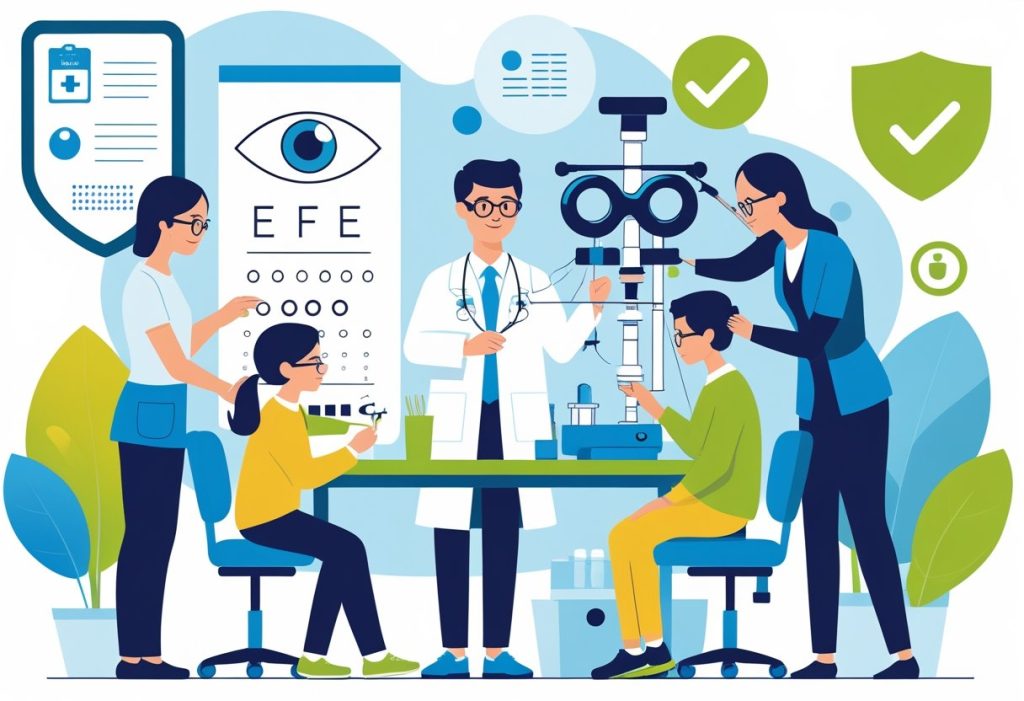When it comes to maintaining your vision, understanding your options for vision correction coverage is essential. Many people are unaware that their vision insurance may include benefits for corrective procedures like LASIK or coverage for glasses and contact lenses. Knowing what your vision insurance covers can help you make informed decisions about your eye care needs and save you money in the process.
At The Modern Medicare Agency, we prioritize your individual needs when it comes to Medicare insurance. Our licensed agents are real people dedicated to helping you find the best vision coverage that aligns with your unique specifications. You can discuss your options one-on-one without worrying about unexpected fees.
Whether you are considering vision correction surgery or simply need new glasses, understanding the extent of your coverage can significantly impact your choices. It’s important to explore the benefits available to you and ensure that your vision needs are met effectively.
Understanding Vision Correction Coverage
Vision correction coverage is vital for maintaining eye health and addressing various refractive errors and conditions. This section explores the different types of vision correction procedures, what coverage typically includes, and the eligibility criteria for securing benefits.
Types of Vision Correction Procedures
Several procedures fall under vision correction options. These include:
- LASIK: A popular laser surgery that reshapes the cornea to correct nearsightedness, farsightedness, and astigmatism.
- PRK: Similar to LASIK, but the outer layer of the cornea is removed. It’s suitable for those with thin corneas.
- Cataract Surgery: Involves removing a cloudy lens and may include implanting an intraocular lens to restore clear vision.
- Corrective Eyewear: Glasses or contact lenses that help correct refractive errors like nearsightedness, farsightedness, and astigmatism.
- Specialty Lenses: Include multifocal and toric lenses designed for presbyopia or astigmatism.
Each of these procedures has different implications for coverage under your vision insurance plan.
What Vision Correction Coverage Includes
Vision correction coverage typically provides assistance for several necessary services and products. Most plans cover:
- Routine Eye Exams: Essential for detecting vision changes and eye health issues.
- Prescription Eyewear: Costs associated with glasses and contact lenses, including specialty lenses.
- Surgical Procedures: Depending on the plan, coverage may extend to LASIK, PRK, and cataract surgery.
- Follow-Up Care: Post-operative visits for surgical procedures usually are included to ensure proper recovery.
Keep in mind that specific benefits can vary greatly. It is crucial to familiarize yourself with your plan’s details to maximize your coverage.
Coverage Eligibility Criteria
Eligibility for vision correction coverage is influenced by various factors. Key points include:
- Plan Specifications: Each insurance plan has unique coverage provisions. Ensure your chosen procedure is included in your policy.
- Pre-Authorization Requirements: Some procedures may require prior approval from your insurance provider.
- Age and Health Conditions: Certain conditions, such as cataracts, may qualify for coverage based on your age or health status.
Understanding these criteria will help you navigate the process more effectively and secure the vision correction services you need. For personalized assistance, consider working with The Modern Medicare Agency. Our licensed agents provide tailored solutions without extra fees, ensuring you find the best coverage aligned with your needs.
Vision Insurance Plans and Benefits
Understanding the specifics of vision insurance plans is crucial for making informed choices regarding your eye care. This section covers the differences between vision and health insurance, outlines key vision benefits, and offers guidance on selecting the right plan for your needs.
Comparing Vision Insurance and Health Insurance
Vision insurance is distinct from health insurance in several ways. While health insurance typically covers a broad range of medical services, including hospital visits and surgeries, vision insurance focuses specifically on eye care.
Vision plans often provide coverage for routine eye exams, glasses, and contact lenses. They may also include allowances for procedures like LASIK surgery. Health insurance may cover eye-related conditions but often with higher out-of-pocket costs.
Understanding these differences can help you determine what type of insurance best suits your needs, allowing for more targeted care when it comes to your vision.
Key Vision Benefits and Allowances
Vision insurance plans generally offer several core benefits designed to support your eye care needs. Most plans include routine eye examinations, providing coverage for one exam per year.
Benefits also typically encompass a choice between prescription glasses or contact lenses, with allowances that specify reimbursement limits. For instance, you may find a plan that offers $150 for glasses or $120 for contact lenses annually.
Additional benefits may include discounts on corrective surgery like LASIK. Familiarizing yourself with these specifics can help you optimize your vision coverage and ensure you receive adequate support for your eye care.
Choosing a Vision Plan
Selecting the right vision insurance plan requires careful consideration of your specific needs and budget. Start by evaluating the frequency of eye exams and whether you require glasses or contact lenses.
Look for plans that offer a comprehensive range of benefits without hidden costs. Many plans, including those from The Modern Medicare Agency, provide transparent information regarding coverage and allowances.
Your choice should consider both flexibility and provider networks, ensuring that you can access quality care. By assessing these factors, you can find a vision insurance plan that strikes the right balance between coverage and affordability, helping you maintain optimal eye health.
Covered Services, Procedures, and Materials
Understanding vision correction coverage is essential for making informed decisions about your eye care options. This section outlines the specific services, procedures, and materials included under vision insurance, helping you determine what is available for your needs.
Coverage for Eyeglasses and Lenses
Most Medicare Advantage plans provide coverage for eyeglasses and lenses if you have a qualifying eye condition. Typically, you can receive one pair of eyeglasses or contact lenses after cataract surgery.
Your plan may cover:
- Eyeglass frames: There are often limits on the amount you can spend.
- Lenses: Standard lenses are usually covered; enhancements like progressive lenses, scratch-resistant coating, and anti-glare coating may depend on your specific plan.
Be sure to review your benefits with a licensed agent from The Modern Medicare Agency who can guide you through the nuances of your coverage.
Contact Lens Coverage
Contact lenses can be a convenient alternative to eyeglasses, but coverage depends on your Medicare plan. Some plans will cover contact lenses if you meet certain eligibility criteria, primarily for individuals diagnosed with conditions such as keratoconus or following certain surgeries.
Most plans include:
- A specific number of contact lenses per year.
- Potential discounts on lens enhancements for improved vision.
It’s crucial to confirm the details with The Modern Medicare Agency, where licensed agents can assist you. They will help ensure you get the best available coverage tailored to your situation.
Laser Eye Surgery and Elective Procedures
Laser eye surgery, including procedures for correcting nearsightedness, farsightedness, and astigmatism, may not be covered under standard Medicare. However, if certain medical conditions warrant it, some plans may offer partial coverage.
Key points to consider:
- Procedures like LASIK may have associated discounts available through your plan.
- Elective procedures typically require out-of-pocket expenses unless deemed medically necessary.
Contacting the knowledgeable representatives at The Modern Medicare Agency can provide clarity on what’s covered. You can receive personalized assistance to navigate your options without incurring unexpected costs.
Costs and Out-of-Pocket Considerations
Understanding the costs associated with vision correction is crucial for planning your expenses. This section discusses the key elements that affect your out-of-pocket costs and how to manage those expenses effectively.
Deductibles, Copayments, and Coinsurance
When you have vision insurance, you might encounter different cost-sharing mechanisms. A deductible is the amount you pay out of pocket before your insurance kicks in. For example, if your plan has a $200 deductible, you need to cover that much in vision care costs first.
Copayments are fixed amounts you pay for specific services, like an eye exam, which might be around $20. Coinsurance, on the other hand, is a percentage of the cost you are responsible for after your deductible is met, such as 20% of the total bill. Knowing these details helps you estimate your potential expenses more accurately.
Managing Out-of-Pocket Expenses
Managing your out-of-pocket expenses effectively can alleviate financial stress. First, make sure to review your vision policy to understand what is covered and what isn’t. This knowledge helps you make informed choices about eye care providers and treatment options.
You can also consider shopping around for eye exams and materials. Prices can vary significantly between providers. Many retailers like Costco and Walmart offer competitive rates for eye exams and eyewear. Utilizing in-network providers can often result in lower copayments and deductibles.
Health Savings Accounts and Flexible Spending Accounts
Health Savings Accounts (HSAs) and Flexible Spending Accounts (FSAs) provide valuable tools for managing vision care costs. An HSA allows you to save money tax-free for medical expenses, including vision correction. Funds can be rolled over from year to year, providing a safety net for future costs.
Similarly, an FSA can help you allocate pretax dollars for eligible health expenses. However, unlike HSAs, FSAs typically have a “use it or lose it” policy, meaning funds must be used within the year. Both options can help reduce your overall out-of-pocket expenses, making vision care more affordable.
For personalized assistance in navigating Medicare options, consider working with The Modern Medicare Agency. Our licensed agents at The Modern Medicare Agency can help you find a plan that fits your needs without the burden of unexpected fees.
Accessing Vision Correction Coverage
Understanding how to access vision correction coverage is essential for maximizing your benefits. It involves knowing how to find in-network providers, understanding the implications of out-of-network coverage, and consulting with the right eye care professionals.
Finding an In-Network Vision Provider
To access your vision correction benefits effectively, start by finding an in-network vision provider. In-network providers have agreements with your insurance plan, which usually results in lower out-of-pocket costs.
You can typically find a list of in-network providers on your insurance company’s website. Look for options like ophthalmologists or optometrists who offer services for vision correction procedures.
When making appointments, always confirm that the provider is still in-network. This step helps you avoid unexpected fees and ensures your insurance covers most of the consultation and treatment costs.
Understanding Out-of-Network Coverage
If you choose to see an out-of-network provider, be aware that your coverage may be limited. Out-of-network providers do not have the same agreements with your insurance, leading to higher expenses for you.
Your plan may reimburse only a portion of the costs, or you may need to pay upfront and submit claims for reimbursement.
To understand your specific out-of-network benefits, review your policy carefully. This information can help you weigh the pros and cons of seeing a non-participating provider against your network options.
Consultation with Eye Care Professionals
Consulting with an eye care professional is crucial in accessing vision correction coverage. Whether you see an ophthalmologist or an optometrist, these professionals provide valuable insights into your vision needs.
During your consultation, discuss your options for corrective procedures like LASIK or glasses. Ensure you understand what your insurance will cover and what potential out-of-pocket costs you may incur.
Your eye care professional can also help you navigate through the documentation required for your insurance claims, making the process smoother. Establishing a clear understanding with your provider will help ensure you receive the coverage necessary for effective vision correction.
For personalized assistance in navigating these options, The Modern Medicare Agency offers expert guidance to help you secure the best Medicare insurance tailored to your needs. Our licensed agents provide one-on-one consultations, aligning Medicare packages with your specifications without hidden fees.
Special Considerations and Medicare Coverage
Navigating Medicare coverage for vision correction involves understanding specific guidelines and limitations. This section covers crucial aspects of Medicare’s approach to vision health, particularly regarding coverage for seniors and those in special populations.
Medicare and Vision Correction
Medicare typically does not cover routine vision services such as eyeglasses and contact lenses. However, it can cover certain eye exams and treatments if they are deemed medically necessary. For instance, if you have conditions like glaucoma or cataracts, you may receive coverage for exams related to these issues.
Additionally, Medicare might cover the costs of intraocular lenses following cataract surgery. This means you can achieve clear vision post-operation without incurring significant out-of-pocket expenses. It’s essential to be aware of what is classified as medically necessary to ensure you receive the appropriate coverage.
Coverage for Seniors and Special Populations
For seniors, managing vision health is crucial due to age-related conditions. Medicare Advantage plans often provide additional vision benefits that Original Medicare does not. These plans may include routine eye exams, discounted eyewear, and even vision therapy.
Moreover, special populations such as individuals with disabilities or chronic conditions may find enhanced coverage options. It’s vital to explore tailored Medicare packages that include vision care benefits. The Modern Medicare Agency can help identify plans that fit your specific healthcare needs without hidden fees.
Eye Health and Long-Term Care
Maintaining eye health is essential, particularly for those entering long-term care facilities. Many facilities provide limited vision care, which may not align with your comprehensive needs. Therefore, understanding your Medicare coverage is critical.
Regular eye exams can help identify issues like sensitivity to light and other conditions. Medicare covers certain evaluations, ensuring that your vision is monitored regularly. By leveraging the right Medicare plan, you can ensure consistent access to necessary eye care services, which are vital for overall health and well-being. For personalized assistance, The Modern Medicare Agency is here to support you in navigating your Medicare insurance needs effectively.
Frequently Asked Questions
Understanding the specifics of vision correction coverage can help you make informed decisions regarding your eye care options. Below are common questions about costs, insurance coverage, eligibility, and procedures.
What are the typical costs associated with vision correction procedures?
The costs for vision correction procedures can vary widely. On average, LASIK eye surgery can range from $2,000 to $3,000 per eye. Other procedures, such as PRK or implantable lenses, might have different pricing structures.
Can LASIK eye surgery be covered by health insurance policies?
Some health insurance policies may offer partial or full coverage for LASIK. It is essential to check with your provider about specific coverage details. The Modern Medicare Agency can help you navigate your options to ensure you understand your policy.
What are the requirements to qualify for laser vision correction coverage?
Eligibility for coverage often depends on various factors, including age, eye health, and vision prescription. Providers might require a comprehensive eye exam to determine if you meet the criteria for surgery.
Does insurance coverage vary for LASIK to correct astigmatism?
Yes, insurance coverage can vary based on the type of vision issue being corrected. LASIK for astigmatism may be categorized differently by some policies. Consulting with The Modern Medicare Agency can clarify your coverage options.
Are there different types of vision correction methods covered by insurance?
Insurance may cover various methods, such as LASIK, PRK, or even contacts and glasses. The specifics can depend on your plan. You should review your policy to see which procedures qualify for coverage.
What steps should be taken to obtain insurance coverage for LASIK?
To secure coverage for LASIK, first, review your insurance policy. Contact your provider to confirm eligibility. The Modern Medicare Agency’s licensed agents can assist you in understanding your plan’s specifics without hidden fees.






